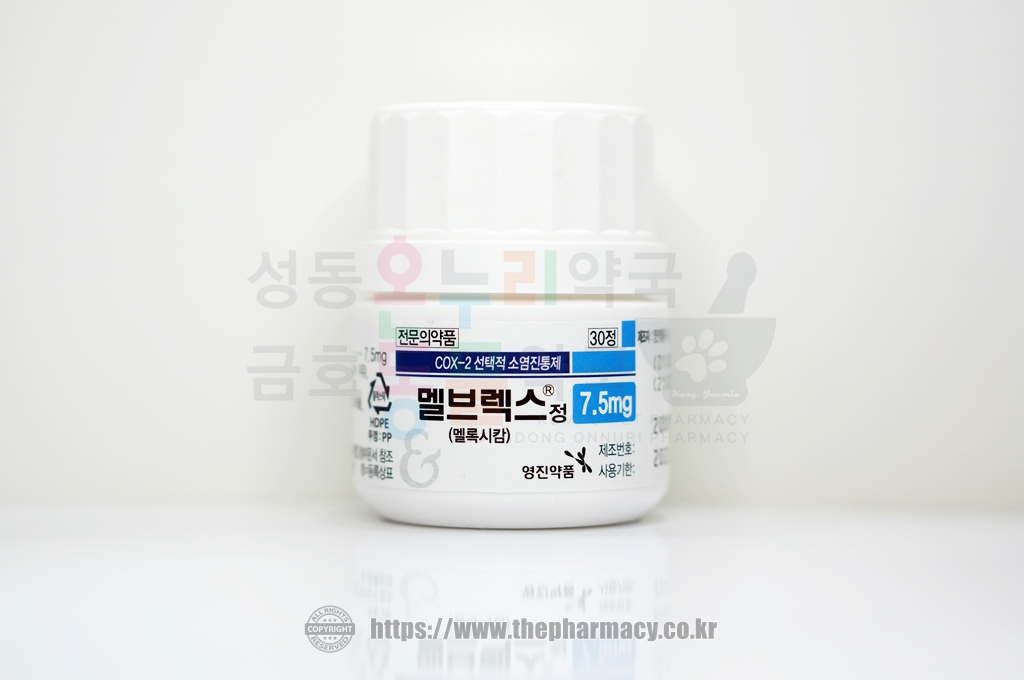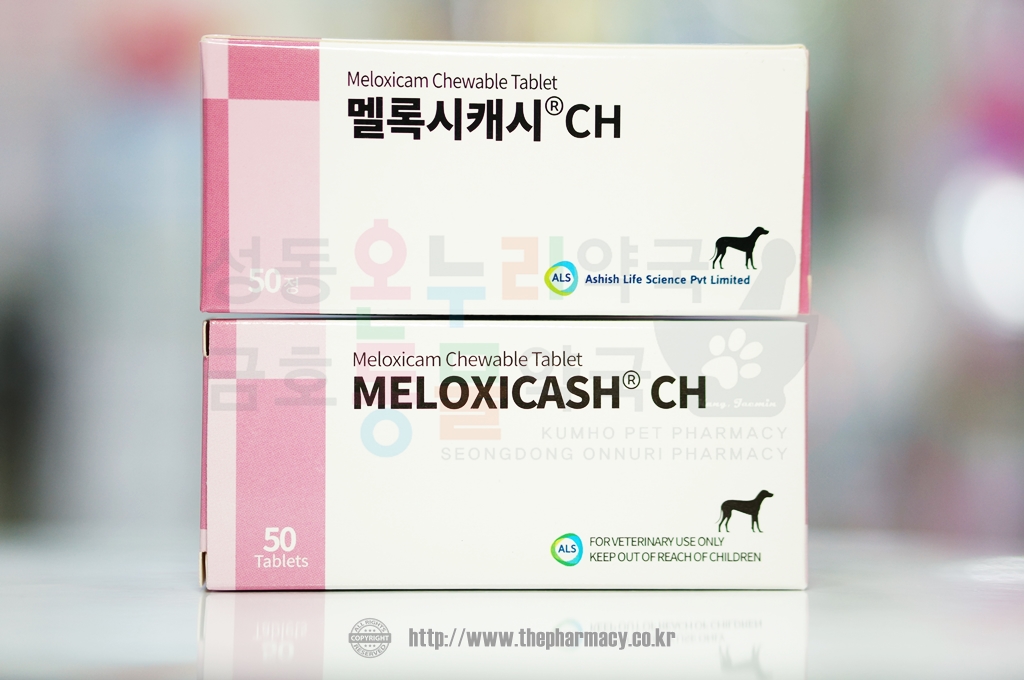상세 약물 자료 (인체의약품 학술 자료)
Therapeutic Classification
NSAIDs (Nonsteroidal Anti-Inflammatory Drugs)
Mechanism of Action
- Piroxicam, tenoxicam과 함께 enolic acid계로 분류되는 NSAIDs로서, 다른 NSAIDs와 마찬가지로 cyclooxygenase를 억제하여 prostaglandin 합성을 저해한다.
- Cyclooxygenase-1보다 cyclooxygenase-2에 대한 억제 작용이 상대적으로 커서 시험관 실험에서 cyclooxygenase-2 / cyclooxygenase-1의 비 (50% 억제에 필요한 약물 농도로서)가 0.013-0.8로 보고되었다. 다른 NSAIDs의 경우 etodolac이 0.1-1로 meloxicam보다 약간 높으며 piroxicam, indomethacin은 각각 33-250, 15-107로 매우 높은 것으로 보고되었다. 이러한 선택성에 의해 위장관계, 신장 및 혈소판 등에 대한 부작용이 감소될 것으로 기대·추정되고 있다.
Clinical Uses
- 요통, 골관절염, 류마티스 관절염, 좌골신경통의 치료
- 국내 승인 효능 :
- 통증과 운동실조를 수반하는 골관절염의 급성 악화시 단기 증상의 치료
- 장기간에 걸친 류마티스 관절염의 증상 치료
Pharmacokinetics
- 생체내이용률 : 경구 : 89%
- 단백결합 : 99.5% (만성 신부전 환자에서는 감소한다.)
- 대사 : 거의 전량이 간에서 산화대사를 받는다.
- 반감기 : 약 20시간
- 혈중최고농도 도달시간 :
- 근육주사 : 0.5-1 시간
- 경구 : 7-11 시간
- 소실 : 비활성형 대사체로서 소변 (약 50%) 및 대변 (약 50%)을 통해 배설된다.
Usual Dosage
- 성인 : 류마티스 관절염, 골관절염 :
- 경구 : 7.5-15 mg/dose, 1일 1회 투여
- 근육주사 : 최대 7일간 15 mg/dose, 1일 1회 투여
- 국내 제조회사의 추천 용량 : 성인 : 경구 :
- 골관절염의 급성 악화시 : 7.5 mg/dose, 1일 1회 투여, 필요시 15 mg/day까지 증량 가능
- 류마티스 관절염 : 15 mg/dose, 1일 1회 투여
- 최대용량 : 15 mg/day
- 신장애시 용량 조절 : 말기 신부전 환자에서는 7.5 mg/day의 투여가 추천된다.
Adverse Reactions
- 가끔 일어나는 부작용
- 간 : 일시적인 GOT/GPT 및 빌리루빈 상승
- 귀 : 이명
- 심혈관계 : 부종, 하지부종, 심계항진, 홍조
- 위장관계 : 복통, 소화불량, 오심, 구토, 변비, 고장 (flatulence), 설사, 트림, 식도염, 위십이지장궤양, 잠혈성 또는 육안적 위장 출혈, 구내염
- 중추신경계 : 두통, 현기증
- 피부 : 소양증, 발진, 두드러기
- 혈액계 : 빈혈, 백혈구감소증, 혈소판감소증
- 드물게 일어나는 부작용
- 신장 : 간질성 신염, 사구체신염, 신증후군
- 위장관계 : 위장관계 천공, 궤양 및 출혈, 대장염
- 피부 : 광과민성
Overdosage / Toxicology
치료 : cholestyramine을 해독제로 사용할 수 있다.
Contraindications
- 본 약물에 과민성
- 급성 소화성 궤양
- Aspirin이나 다른 NSAIDs에 기관지경련의 병력이 있는 환자
- 심한 간장애
- 중증 신부전 환자로서 혈액투석을 받고 있지 않은 환자
- 15세 이하 소아
- 임신부, 수유부
Precautions
- 다음의 경우에는 주의하여 사용한다. :
- 위장관계 부작용의 소인이 있는 환자 : 소화성 궤양, 상부 위장관 질환, 궤양성 대장염, 흡연, 노인, corticosteroids의 병용 투여, 알콜 중독, 스트레스가 심한 환자 등
- 고혈압, 기타 심혈관계 질환
- 출혈 질환
- 신장애
- 다른 NSAIDs에 알러지 반응의 병력
- Helicobacter pylori 감염증
- 장기 투여시 정기적으로 뇨검사, 혈액검사, 간기능검사, 잠혈검사 등 임상검사를 실시하여야 한다.
Pregnancy Risk Factor
- FDA Category – C (태아에 대한 위험성을 완전히 배제할 수 없음)
- FDA Category – D (임신3기에 투여시)
Pregnancy Implication
임신부, 수유부에는 투여를 삼간다.
Stability
차광 보관
Interactions
- 효과 감소 :
- ACE (angiotensin converting enzyme) 억제제 : ACEIs의 혈압강하 효과를 감소시킬 수 있다.
- β-blockers의 혈압강하 효과를 감소시킬 수 있다.
- 이뇨제의 효과 감소
- 효과/독성 증가 :
- 다른 NSAIDs : 소화성 궤양, 위장관 출혈의 위험
- 경구용 항응고제, heparin, ticlopidine : 출혈의 위험성이 증가될 수 있다.
- 혈전용해제 : 출혈의 위험성이 증가될 수 있다.
- Lithium의 독성이 증가될 수 있다.
- Methotrexate의 농도/독성 증가
monitoring parameters
정기적으로 뇨검사, 혈액검사, 간기능검사, 잠혈검사
References: 드럭인포 의약학술정보
(드럭인포 의약학술정보에 유료회원으로 가입하면 의약품 성분들에 대한 상세 자료를 얻을 수 있습니다)
상세 약물 정보 (동물의약품 학술자료)
Pharmacology and mechanism of action
Meloxicam is a nonsteroidal anti-inflammatory drug (NSAID). Like other NSAIDs meloxicam has analgesic and anti-inflammatory effects by inhibiting the synthesis of prostaglandins. The enzyme inhibited by NSAID is the COX enzyme. The COX enzyme exists in two isoforms: COX-1 and COX-2. COX-1 is primarily responsible for synthesis of prostaglandins important for maintaining a healthy gastrointestinal tract, renal function, platelet function, and other normal functions. COX-2 is induced and responsible for synthesizing prostaglandins that are important mediators of pain, inflammation, and fever. However, it is known that there is some crossover of COX-1 and COX-2 effects, and COX-2 activity is important for some biological effects. Meloxicam is relatively COX-1 sparing compared to older NSAIDs, but it is not known if the specificity for COX-1 or COX-2 is related to efficacy or safety. Meloxicam has a half-life of 23-24 hours in dogs, 30-40 hours in calves, and 8.5 (range 5-14.5) in horses. In cats, it had a half-life of 15 hours in experimental cats, but in a larger population pharmacokinetic study, the half-life was 26 hours, with volume of distribution of 0.24 L/kg. Meloxicam is highly protein bound. Oral absorption is almost complete in dogs when administered with food. Absorption is 85%-98% in horses and is not affected significantly by feeding. Oral absorption was 100% in ruminant calves, with a half-life of 20-43 hours, and 79% and 72% in goats and sheep, respectively.
Indications and clinical uses
Meloxicam is used to decrease pain, inflammation, and fever. It has been used for the acute and chronic treatment of pain and inflammation in dogs and cats. One of the most common uses is osteoarthritis, but it has also been used for pain associated with surgery. Both acute and long-term safety and efficacy have been established for dogs. In studies performed in dogs, higher doses (up to 0.5 mg/kg) were more effective than lower doses, but also were associated with a higher incidence of gastrointestinal adverse effects. Use in cats is limited to either short-term use or long-term use at low doses. In cats, meloxicam has comparable, and even superior, effectiveness compared to butorphanol for treating pain associated with surgery. Acute response to treating fever in cats also has been demonstrated. In pigs, meloxicam is effective for mastitis-metritis-agalactia (MMA) syndrome. In horses, meloxicam is effective for treating pain and inflammation associated with surgery. A dose of 0.6 mg/kg per day to horses for long periods (6 weeks) was well tolerated and produces plasma drug concentrations in the therapeutic range. In European countries, it is registered for use in horses, pigs, and cattle. In these countries, the approved use is adjunctive therapy of acute respiratory disease, diarrhea, and acute mastitis. It has also been effective to decrease discomfort associated with dehorning procedures in cattle. Meloxicam also is used extralabel in many exotic and zoo animals, including reptiles and birds, for treatment of pain and inflammation.
Precautionary information
Adverse reactions and side effects
Major adverse effects are gastrointestinal, including vomiting, diarrhea, and ulceration. Because meloxicam appears to be relatively COX-1 sparing, adverse effects are expected to be less than other NSAIDs that are not as selective, but this has not been demonstrated on controlled clinical trials. Kidney injury, especially in dehydrated animals or animals with preexisting renal disease, has been shown for some NSAIDs. Kidney injury has been reported in dogs from doses of 0.3-0.5 mg/kg, and higher. Gastrointestinal ulceration has been observed when dogs were administered doses slightly higher than registered doses. In cats at high doses (five times the dose), vomiting and other gastrointestinal problems were reported. With repeated doses (9 days) of 0.3 mg/kg/day to cats, inflamed gastrointestinal mucosa and ulceration were observed. At 0.05 mg/kg there were not changes on platelet aggregation in cats. Kidney injury has been observed in cats, particularly when high doses were administered repeatedly or when administered at lower doses to dehydrated cats. However, there is no evidence that well-hydrated cats with kidney disease are more dependent on renal prostaglandins to maintain kidney perfusion; therefore meloxicam may be administered to these cats at low doses if hydration is maintained. At the
recommended dose of 0.6 mg/kg to horses, it has been well tolerated but at high doses to horses (3-5 times the recommended dose), there was decreased protein, gastrointestinal injury, and kidney injury.
Contraindications and precautions
Dogs and cats with preexisting gastrointestinal problems or renal problems may be at a greater risk of adverse effects from NSAIDs. However, at a dose of 0.02 mg/kg per day, long-term use in cats did not cause progression of renal disease in cats with preexisting renal disease. Safety in pregnant animals is not known, but adverse effects have not been reported. The manufacturer does not recommend a second dose of meloxicam injection to cats. The oral meloxicam solution of meloxicam contains xylitol. Xylitol is an artificial sweetener that can be toxic to dogs and can produce hypoglycemia and liver injury with high doses exceeding 0.1 g/kg. With approved doses of meloxicam oral solution, the toxic level of xylitol is not likely to be exceeded, but one should be cautious about adding other drugs that also contain xylitol.
Drug interactions
Do not administer with other NSAIDs or with corticosteroids. Corticosteroids have been shown to exacerbate the gastrointestinal adverse effects. Some NSAIDs may interfere with the action of diuretic drugs and ACE inhibitors.
Instructions for use
Liquid medication may be added to food for dosing. When using veterinary liquid formulation, the dropper bottle for the 1.5 mg/mL suspension is designed to deliver 0.05 mg per drop or one drop per pound body weight (two drops per kg body weight). Observe manufacturer’s instructions when using dosing syringe supplied with product. Some veterinarians have used the human generic tablets for administration to horses and dogs. The human formulation has been shown to be absorbed to the same extent as the veterinary formulations. However, caution is advised when administering the oral human tablets to dogs. The tablet size (7.5 mg) is much larger than the highest dose that should be administered to dogs.
Administration to cats in the US is only approved as a single dose of 0.3 mg/kg. However, long-term use at 0.05 mg/kg q24h oral has been approved for cats in other countries for prolonged use, and low doses 0.01-0.03 mg/kg q24h have been administered safely to older cats with kidney disease.
Patient monitoring and laboratory tests
Monitor gastrointestinal signs for evidence of diarrhea, gastrointestinal bleeding, or ulcers. Because of risk of renal injury, monitor renal parameters (water consumption, blood urea nitrogen [BUN], creatinine, and urine-specific gravity) periodically during treatment.
Formulations
- Meloxicam is available in 0.5-mg/mL (0.02 mg per drop) oral suspension, 1.5-mg/mL (0.05 mg per drop) oral suspension, 0.5% (5-mg/mL) injection, and 7.5- and 15-mg tablets (human preparation). An oral transmucosal is available as a spray using the Promist technology. The spray is available in three sizes: 0.25 mg, 0.5 mg, and 1.075 mg per spray.
- In Europe, 1.0 and 2.5 mg/kg tablets are available for dogs and a 15-mg/mL oral suspension and 50 mg per gram oral paste is available for horses. In Europe a 20 mg/mL injectable solution is available for large animals.
Stability and storage
Meloxicam has been compounded with water, 1% methylcellulose gel, and simple syrup or a suspending and flavoring vehicle in a ratio of 1:1 at concentrations of 0.25, 0.5, and 1.0 mg/mL. These formulations were stable for 28 days at room temperature or under refrigeration.
Small animal dosage
- Dogs
- 0.2 mg/kg initial loading dose PO, SQ, or IV, and then 0.1 mg/kg q24h thereafter PO, SQ, or IV.
- Oral transmucosal spray (bioequivalent to oral suspension): 0.1 mg/kg sprayed in dog’s mouth once per day.
- Cats
- 0.05 mg/kg q24h PO, with reduction in dose if chronic treatment is pursued. Long-term treatment may be reduced to 0.03 mg/kg q24h, or 0.05 mg/kg q48h, to 0.05 mg/kg q72h, PO.
- Single doses of 0.15 mg/kg SQ may be administered for acute conditions. (There is Food and Drug Administration [FDA] approval in the US for single doses up to 0.3 mg/kg SQ.)
Large animal dosage
- Pigs
- 0.4 mg/kg IM, which may be repeated in 24 hours.
- Cattle
- 0.5 mg/kg q24h IV, IM, or SQ.
- Sheep and small ruminants
- 1 mg/kg, single dose, IV, IM, SQ, or PO.
- Horses
- 0.6 mg/kg q24h IV or PO. In foals less than 7 weeks of age, the frequency may be increased to 0.6 mg/kg q12h because of more rapid clearance.
Regulatory information
Recommended withdrawal time for racing horses is 3 days for urine testing. Recommended cattle withdrawal time: 8-20 days for slaughter (depending on the study and the country). Generally 20 days for slaughter is used. Withdrawal time for milk is 3.5-6 days, depending on the study and country of approval.
RCI Classification: 3
제품 정보
- 약(藥)에 대한 전문가는 “약사(藥師)”입니다.
- 방문하시기 전에 “재고확인”이나 “수량예약”이 필요하시면 카카오톡으로 문의해주세요. 약국 실장님께서 답변드리겠습니다.
- 단, 전화나 카카오톡으로는 가격 문의를 받지 않습니다. 가격은 약국에 방문하신 고객님들께만 공개하고 있습니다.
- 약국에 방문하시는 환자분들이 많은 관계로, 전화나 카카오톡으로는 재고확인만 가능하며, 약사님께 여쭤봐야하는 약 관련 “상담”은 방문하신 고객님만 받으실 수 있습니다.
- 약에 대한 내용은 약에 대한 전문가인 약사님께 상담받는 것이 가장 정확하며, 상담이 필요하실 경우 “고객님의 주치약사님”을 찾아주시기 바랍니다.
- 성동온누리약국&금호동물약국에 “약력관리고객”으로 등록하신 고객님들께는 복용 중이신 약물들의 상호작용을 비교 분석해드리고 있습니다. 또한 약물 복용 기록을 관리해드리고 있으며, 지난번 약 복용 후 경과 및 호전 양상에 따라 적절한 의약품을 추천해드리고 있습니다.
- 또한 “약력관리고객”으로 등록하신 고객님들께서는 구매하신 제품들에 대한 자세한 안내문을 모바일로 받아보실 수 있습니다.
- 단, “약사님과의 상담 서비스”는 약국에 방문하신 환자분들과 고객님들만을 대상으로 제공되므로, 약국에 직접 방문해주셔야 합니다.
- 처방대상동물용의약품, 전문의약품 등 일부 품목은 처방전이 필요할 수 있습니다.
- 본 웹사이트 게시물의 URL은 자유롭게 공유할 수 있습니다. 단, 게시물 내용 또는 웹사이트 컨텐츠를 다른 곳에서 상업적인 목적으로 사용할 수 없으며, 이를 저장하거나 다른 곳에서 배포하고자 할 경우에는 사전에 제작자의 동의를 받아야 합니다.
- 위 제품이 “의약품”인 경우, 약사법에 따라 “의약품의 택배거래”는 불법인 관계로, 전화나 카카오톡을 통한 택배발송 요청은 불가합니다. 필요하신 경우 대리인 분이라도 약국에 방문해주셔야만 합니다.
- 위 제품이 “의약품”이 아닌 경우, 방문하지 않으셔도 택배요청을 할 수 있습니다. 의약품 여부가 불분명할 경우 카카오톡으로 문의해주세요.
감사합니다! 😄
- 더파머시
- ㄷㅍㅁㅅ
- 성동온누리약국
- ㅅㄷㅇㄴㄹ약국
- ㅅㄷㅇㄴㄹㅇㄱ
- ㅅㄷㅇㄴㄹ
- 금호동물약국
- ㄱㅎㄷㅁㅇㄱ
- ㄱㅎ동물약국
- ㄱㅎㄷㅁ약국
- 금호ㄷㅁㅇㄱ
- 금호동물ㅇㄱ
- 금호동물
- 성동동물
- 금호약국
- 금호ㅇㄱ
- ㄱㅎ약국
- ㄱㅎㅇㄱ
- 공항축산
- ㄱㅎㅊㅅ
- 청려원
- ㅊㄹㅇ
- 협성가축약품
- 가축약품
- 협성
- 협성가축약국
- 협성가축
- ㅎㅅㄱㅊㅇㅍ
- ㄱㅊㅇㅍ
- 동물병원
- 금호동물병원
- ㄱㅎ동물병원
- ㄱㅎㄷㅁㅂㅇ
- 금호ㄷㅁㅂㅇ
- 금호동물ㅂㅇ
- 금호동병
- ㄷㅁㅂㅇ
- 메디컬센터
- 메디칼센터
- ㅁㄷㅋㅅㅌ
- 약사
- 의사
- 수의사
- 가격
- price
- 금액
- amount
- 어디서
- where
- 파나
- 파나요
- buy
- 구매
- purchase
- 서울
- seoul
- 한국
- 국내
- korea
- 성동
- 성동구
- seongdong
- 금호
- kumho
- 펫
- pet
- 동물
- animal
- 강북
- 강남
- 종로
- 중구
- 동대문
- 광진
- 서초
- 서울약국
- 서울동물약국
- 서울동물약
- 서울동물
- 약국
- pharmacy
- 동물약국
- animal pharmacy
- pet pharmacy
- 더파머시
- the pharmacy
- 동물주사
- 강아지주사
- 고양이주사
- 동물주사놓는방법
- 자가접종
- 강아지
- 고양이
- 백신
- 강아지 백신
- 고양이 백신
- 강아지 자가접종
- 고양이 자가접종
- 새살연고
- EGF
- 레보티록신
- levothyroxin
- 메트로니다졸
- 메트로디나졸
- 진크피
- 임테기
- 임신테스트기
- 포러스
- 핵시딘
- 헥사딘
- 수액
- 염화나트륨
- 심장사상충
- 심장사상충약
- 외부기생충
- 내부기생충
- 외부구충제
- 내부구충제
- 강아지 감기
- 고양이 감기
- 강아지 설사
- 고양이 설사
- 강아지 변비
- 고양이 변비
- 강아지 콧물
- 고양이 콧물
- 강아지 기침
- 고양이 기침
- 강아지 해열제
- 고양이 해열제
- 기침
- 감기
- 콧물
- 해열제
- 설사
- 변비
- 신이고
- 신장질환을이긴고양이
- 고양이라서다행이야
- 아반강고



